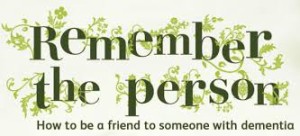Monthly Archives: June 2015
Talk Therapy and Dementia
 I have been focused on working, as a therapist and gerontologist, with older adults and adult children of aging parents for over 12 years now. During this time, many different kinds of people and situations have presented themselves. Many unique situations have emerged as well as many commonalities as people first encounter and then work through the familiar landmarks inherent in the territory of older age.
I have been focused on working, as a therapist and gerontologist, with older adults and adult children of aging parents for over 12 years now. During this time, many different kinds of people and situations have presented themselves. Many unique situations have emerged as well as many commonalities as people first encounter and then work through the familiar landmarks inherent in the territory of older age.
A topic has recently come up in conversations with colleagues and I’ve been asked to write a little about it. That is the topic of doing talk therapy with people who have Alzheimer’s or other dementias – something which I believe can be a big benefit to many of these individuals.
In my experience, people with early stage Alzheimer’s or even early middle stage have benefited from talk therapy. The first ingredient in successful therapy with this group is, like with most therapy patients but even more so, is trust. I have found that people who may be cognitively challenged have other senses which are heightened, including their intuition and discernment of an inauthentic person, someone disrespectful or rushed.
I have come to believe that as in the case of people whose eyesight may be failing, and their hearing becomes more acute to compensate, so it is with people whose cognitive capacity may be declining. Their other senses become greater in order to compensate. As a general rule, in my experience working with early and middle stage Alzheimer’s patients, their ability to sense the environment, the “vibes” if you will is acute. They know when they are being treated disrespectfully or cruelly, i.e. in a demeaning fashion. Conversely, if you are genuine and caring and kind with them, they are forgiving and oh so grateful to be treated as a valued human being.
So often they are not treated as such. They are spoken over, or spoken around or ignored or infantilized or neglected. I have come in to their homes, invited by family members because the person was depressed. And when we begin to get to know each other, and I talk with them about their current situation and their past and their memories, using photographs or music or other “prompts”, I find their gratitude and increased self-worth palpable. I also find that they make good use of their intact long term memories, working on issues from childhood and young/middle adulthood that have haunted them, even if no longer consciously. Their depression may have simply been sadness.
For example, one woman I saw for two years had been in therapy as a young mother. So she was quite comfortable with the therapeutic setting. In therapy, she worked on some early traumas and experienced healing. The memories no longer elicited reactions of wincing and pain. We were able to diffuse them through recall and loving attention to them without judgment but with understanding and compassion. She had one memory of having to had to hide that she was Jewish when her father took a new job away from their beloved and closeknit NYC neighborhood. She was afraid that if she said anything that revealed her Jewishness he would lose his job which was undoubtedly true. That was a lot of pressure on a young girl! She also remembered, after we had worked together for a while, the shame of bed-wetting into teen years and how she had been demeaned and belittled by her mother about that.
This woman experienced healing through loving attention as she explored some painful memories. In her short term memory, as it declined, she did not remember everything we talked about from week to week. Her adult children joked that they should tell her she went to therapy and not really take her, she wouldn’t know the difference they said. But I knew that what she was experiencing in therapy was contributing to very real increased peace of mind for her, whether she recalled it consciously or not. I felt that subconsciously some pain, shame and sorrow eased.
I won’t take time here to go and find research studies to back up my in-the-field experiences. You can do that by searching for “talk therapy and dementia”.
I do believe, however, in the benefits that can be found in doing loving talk therapy with skilled, trained and experienced competent therapists. Please do not count dementia patients out for respectful treatment and gentle exploration of life review memories. This is what Eric and Joan Ericson said is our developmental task in older age: integrity vs despair. Integrity means to become whole, to look at the integral parts of our lives, using all of our senses. This can be done with Alzheimer’s patients. And they can be helped to expand their integrity and thus decrease their despair. And perhaps take less medications for depression! I have seen this with several of my older adult patients over the years. In fact, they are some of my favorite people and I consider them my teachers.